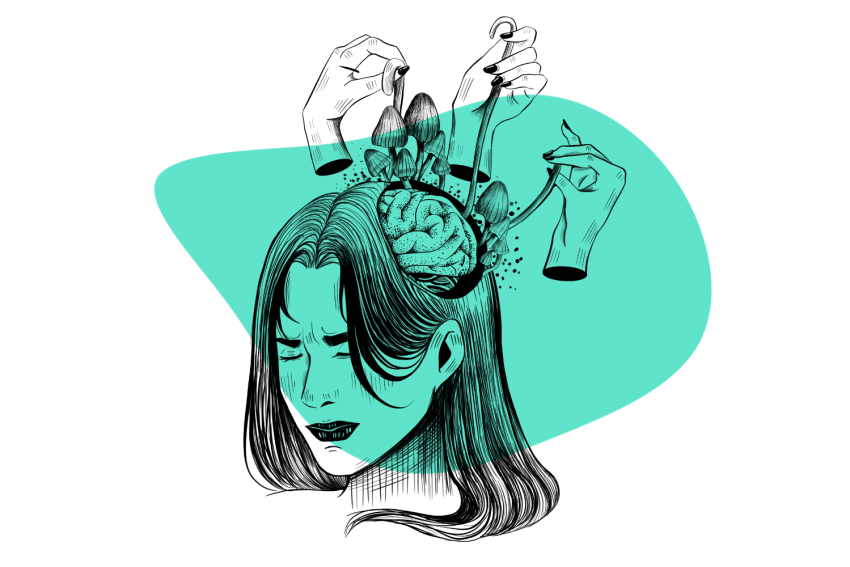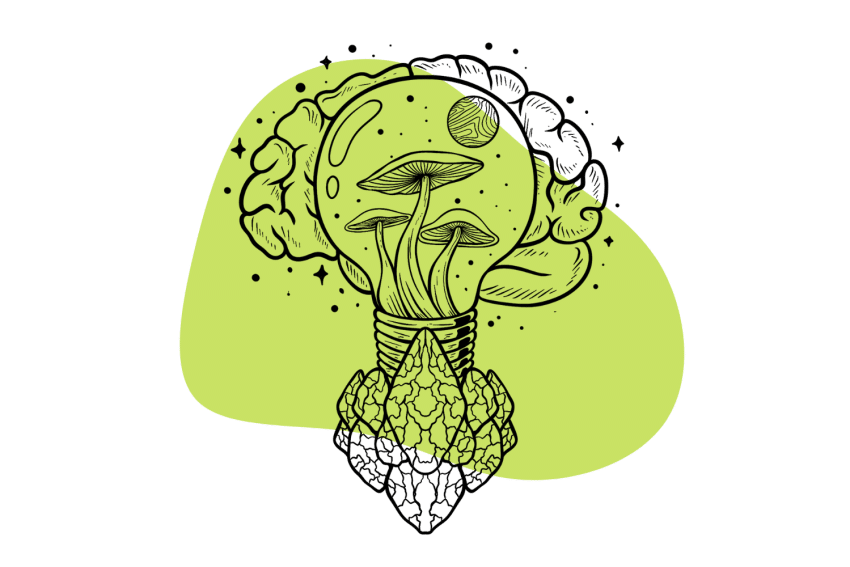Psilocybin (And) Therapy May Help Smokers Become “Non-Smokers”
A 2014 pilot study on psilocybin for smoking cessation resulted in a tsunami of publicity for psychedelic drugs. Ten years later, researchers are digging into what made it so effective and finding a lot more at play than just the drug.

Psilocybin-assisted psychotherapy (P-AT) for nicotine addiction presented early successes among small sample sizes in 2014 [1]. Initial findings of the 15-person trial found 80% success rates after six months — leading treatments for quitting smoking typically around 35%.
Long-term follow-up surveys a year later showed the number of participants who stopped smoking had dropped to a still-impressive 67% [2]. One of the original researchers of this study has now teamed up with Dr. Neşe Devenot and others to examine the reasons behind its success.
One of the biggest findings: “P-AT might be a leading way of promoting identity and personality changes within a clinical setting [3]” (emphasis mine.) One of the biggest factors in successfully quitting smoking is being able to view yourself as a “non-smoker.”
To do this, participants:
- Partook in behavioral therapy programs before dosing sessions
- Created a mantra for themselves for whenever they felt like smoking again
- Took part in mental exercises aimed at viewing nicotine addiction as an “outside force” and not their own identity
Devenot et al. found this to be a vital part of the research and cite it as heavily influencing those who successfully quit at long-term follow-up. While this may excite psychedelic researchers looking for ways to improve their success rate, it also carries a potential for grave concerns.
Let’s break down this study, the good and bad implications, and why this matters for all psychedelic research.
Psilocybin & Reframing Our Self Image
After noticing significant entries with similar language, Dr. Neşe Devenot et al. discovered what takes place beforehand may help indicate success. Most of these similarities trace back to the introductory framework of cognitive behavioral therapy (CBT) before the session.
CBT aims to replace your normal thinking process with a better one. Frequent smokers likely don’t think much before lighting up another cigarette — CBT seeks to change this, encouraging them to change their behaviors around smoking before quitting.

Several themes became apparent when combing through entries from participants the day after their dosing sessions.
Namely, many of the passages mentioned wanting to “quit for life,” the joy of “becoming a non-smoker,” and discussed how “simple” quitting smoking was. Within the CBT sessions beforehand, many of these thought patterns were already well-established and frequently shone through on days of dosing.
Researchers made sure to prime participants by giving them material to help prepare for the experience. Doing so helped smokers shift their mentality around the addiction and begin to see themselves and their actions in a different light.
Psilocybin & the Sense of Self
Priming here is not dissimilar from other attempts to kick the habit. Through mantras and other attempts at framing, participants received priming to strengthen their chances of quitting.
Here are some common themes from the sessions, along with quotes from journal entries showing how they played out in hallucination form:
- Don’t Give In — Abstinence was the solution researchers pushed for, advocating one cigarette could lead to many. One participant described an experience around this when they lit a single cigarette which then “spread into a grid … [of] 1000 cigarettes … [I] tried to ‘count’ all the cigarettes in my lifetime … and saw that there’s no such thing as ‘just one.'”
- Quitting is Simple — We make quitting hard, but doing so is actually a simple decision. One report captures this, saying, “I had made the idea of quitting smoking difficult and painful. The reality was and is that quitting smoking is easy.”
- You Are Not Your Addiction — Nicotine is controlling your desire to smoke as an outside force. One entry mentions being overcome by a familiar shadow and realizing it’s the nicotine addiction anthropomorphized. “The shadow wants me to smoke. It wants a cigarette … I realize how selfishly the shadow nicotine addiction uses my body.”
- You Are a Non-Smoker — Perhaps the most important is seeing oneself as a non-smoker. One person uses this justification to get through withdrawal symptoms. “Your body has been used to nicotine for years and your body has accommodated it eventually … symptoms are therefore a sign that your body is indeed adjusting to its new life as a non-smoker.”
These helped the participants to reframe the way they thought about themselves and start their new life — the one they were supposed to be living all along — as a non-smoker.

Psychedelic Priming: The Good & the Bad
Drs. Devenot et al. present one of the biggest findings in psychedelia in several ways. Priming participants for success may be the best way to ensure it happens — but there is danger in this.
While priming can help participants view themselves differently, ethical considerations are inherent. Let’s break down the good and bad news this research brings to the table.
How Psychedelic Priming Helps
As the study’s authors put it, “Psychedelic-assisted identity shift represents a theoretical mechanism for the efficacy of psychedelics in the treatment of addiction.” Priming participants for a successful outcome likely produces far better, more reliable results.
Since the therapeutic sessions before dosing appropriately primed participants to begin viewing themselves as non-smokers, the psychedelic experience may have been more impactful. The consequences of this could reverberate through all research and prompt deeper questions about the method of study.
The psychedelic experience is notorious for being unpredictable, and this may assist in reducing one of these variables. With this as a starting point, it’s possible to study which CBT methods pair best with P-AT and hone therapeutic sessions within psychedelic trials.
Additionally, it presents another variable in the efficacy of psychedelics related to the ever-important setting. As one of the two biggest factors in an enjoyable experience — mindset being the other — we should spend more time on research like this to figure out how to create the best environment.
While adding a new wrinkle to the findings from 2014, they are not alone in understanding the importance of an identity shift for smoking cessation. A study involving ten people intent on smoking found that transitioning to a view of themselves as non-smokers “may be necessary for successful quitting.” [4]
In a press release from the University of Cincinnati, Devanot compares this effect to skiing after a fresh snowfall — acknowledging it’s an oversimplification — by saying, “The entrenched grooves of bad habits might not have as much pull on our skis, so we can lay down other paths.”
Going a step further, the framework and priming might be like having a trained guide tell you the best path down.

Potential Concerns of Psychedelic Framing
From here, it’s not hard to see the dark step forward this line of thinking might take. While the news may be exciting for something like quitting smoking, this also means facilitators could find success priming participants for anything. The paper warns of this, concluding “the forms of identity shift [P-AT] enables will require new levels of ethical consideration.”
In particular, there are a few concerns:
- Misuse of Psychedelic-Assisted Therapy — Jordan Peterson is the loudest voice in the psychedelic movement, alluding to “converting” people away from LGBTQ+ identities. He’s not alone; several psychedelic pioneers suggested the same throughout the 60s.
- An Urgent Need for “Enhanced Consent” — Anytime something can alter self-identity, it’s not enough to give a pamphlet. We must set boundaries to “respect patient autonomy and encourage empowerment.” This has come up in the past as well, and we have not yet come to a clear response for it.
- Researchers Should Include More — We can’t move forward if we don’t understand where we’re coming from. Most of the priming wasn’t included in the original report, even though it could have also had a major impact on future studies.
To bolster these concerns, Dr. Devenot et al. showcase several other studies, including:
Studies On the Misuse of Psychedelic Therapy
Though Dr. Devenot doesn’t cite her own article, her recent study, “Right Wing Psychedelia: Case Studies in Cultural Plasticity and Political Pluripotency,” is all about this. Here, she and Dr. Brian Pace argue that the belief in psychedelics to increase liberal feelings and connectivity to nature ignores radical actors and their actions [5].
We often associate the mystical feelings of psychedelics with a desire to improve the world — and for many of us, this is likely the case. However, “Jordan Peterson, corporadelic actors, and members of several neo-Nazi organizations,” show it’s not cut-and-dry.
Rather, as the paper argues, psychedelics are politically pluripotent — meaning they can amplify emotion in several different directions. The increased suggestibility of minds under the influence of these drugs raises massive ethical questions.
Another study the authors cite is a 2014 assessment of suggestibility in volunteers with and without lysergic acid diethylamide (LSD).
Dr. Robert Carhart-Harris and his team discovered LSD made participants more susceptible to believing:
- Their outstretched arm was getting heavier
- Distortions in time
- They were experiencing localized anesthesia in their hand [6]
In the above study, 80% of participants experienced this enhanced suggestibility, the same as those who quit smoking after six months.
Devenot includes a warning from the book Addiction Treatment: Science and Policy for the Twenty-first Century:
We are seeking to reshape the addict’s motivational system — to change the addict as a person. In some cases, this may go to the root of his or her being. Perhaps we had better hope that our techniques for doing this never become too successful because in the wrong hands…. [7]
Remember, as hippies were living it up in the 60s, the government used LSD for torture.
Studies Pointing to the Need for Enhanced Consent
Enhanced consent for psychedelics involves broader education and realistic expectations. It’s not enough to tell participants what you seek to accomplish; they have to know how you’ll do it when it involves changing their fundamental identity.
Telling someone you can help them quit a habit they don’t like is different from telling them you can change the way they identify. Before fully appreciating this, we’ll need more qualitative studies of suggestibility and personality change.
Psychedelics aren’t alone in their ability to alter a person’s identity or in the ethical questions surrounding this. A 2009 study found deep brain stimulation (DBS) treatment for Parkinson’s disease may do this and called for physicians to “better inform patients with these disorders … about the relative benefits and risks [8].”
While another study questioned the personality effects of DBS, it still called for a better way to understand and evaluate these changes [9]. Researchers question this change mainly on the personality, identity, autonomy, authenticity, agency, and/or self (PIAAAS) scale.
Dr. Frederic Gilbert et al. found the impact of DBS on personality mostly unsubstantiated but referenced several problems with the PIAAAS scale. “[W]e call for the development of better instruments capable of capturing potential postoperative variations of PIAAAS.”
Increased Thoroughness In Psychedelic Studies
Researchers should note virtually everything about the environment and cognitive efforts for future studies.
The original 2014 study only had this to say about the environment:
- “Participants wore an eye mask and listened to a music program through headphones.”
- “[S]taff provided non-directive interpersonal support for managing psilocybin effects, but did not deliver smoking cessation-specific content.”
- “In preparatory sessions participants developed their most important reasons to quit smoking into a brief motivational statement … [and] repeated their brief motivational statement for smoking cessation before each psilocybin administration.”
They did mention the programs they used for cognitive therapy sessions beforehand, along with their methodology, but too many pieces of information are missing. For starters, researchers often believed Western classical music was the most effective, but Dr. Matthew Johnson (also involved in the original 2014 study and Dr. Devenot’s latest) and his team found otherwise.
The authors state the original study involved a musical component where “after sampling each of two musical playlists across the first two psilocybin sessions, participants chose their preferred playlist for a third [10].”
The resulting data shows negligible differences — positive or negative — between the two, slightly favoring the overtone playlist. Yet, since the original study didn’t yet know the importance of including this element, we have been pushing a singular genre of music — notably one overrun with European aristocrats — instead of testing out the options.
Dr. Devenot’s team (Dr. Johnson included) concluded their paper by saying:
[T]he analysis of psychedelic clinical trials should take a critical approach to set and setting that examines the impact of the full treatment context on clinical outcomes. Such an approach requires attending to the assumptions embedded in the treatment manuals and the unique psychotherapeutic modalities used alongside psychedelic substances to enact behavioral change.

Conclusion: How Psychedelics Change Your Mind
Several studies into psychedelics have pointed to potential therapeutic effects but rarely dive into the reasons for their success. Perhaps, in an attempt to overplay the success of the drug, researchers are downplaying the hard work going into each session.
This study brings up questions about every other psychedelic research study ever conducted.
Did the successful trials of veterans with PTSD actually help by getting them to no longer see themselves as a person with PTSD?
What about existential anxiety, treatment-resistant depression, or any of the other reasons we’re looking at these drugs?
If so, what does this say about our other interventions for these concerns — is therapy more successful only after a shift in personal identity?
Hopefully, this critical new study will result in an evaluation and reporting of everything going into a psychedelic experience. Without this information, we cannot improve effectiveness across the board.
References
- Johnson, M. W., Garcia-Romeu, A., Cosimano, M. P., & Griffiths, R. R. (2014). Pilot study of the 5-HT2AR agonist psilocybin in the treatment of tobacco addiction. Journal of Psychopharmacology, 28(11), 983-992.
- Johnson, M. W., Garcia-Romeu, A., & Griffiths, R. R. (2017). Long-term follow-up of psilocybin-facilitated smoking cessation. The American journal of drug and alcohol abuse, 43(1), 55-60.
- Devenot, N., Seale-Feldman, A., Smith, E., Noorani, T., Garcia-Romeu, A., & Johnson, M. W. (2022). Psychedelic identity shift: a critical approach to set and setting. Kennedy Institute of Ethics Journal, 32(4), 359-399.
- Meijer, E., Vangeli, E., Gebhardt, W. A., & van Laar, C. (2020). Identity processes in smokers who want to quit smoking: a longitudinal interpretative phenomenological analysis. Health, 24(5), 493-517.
- Pace, B. A., & Devenot, N. (2021). Right-wing psychedelia: Case studies in cultural plasticity and political pluripotency. Frontiers in Psychology, 4915.
- Carhart-Harris, R. L., Kaelen, M., Whalley, M. G., Bolstridge, M., Feilding, A., & Nutt, D. J. (2015). LSD enhances suggestibility in healthy volunteers. Psychopharmacology, 232, 785-794.
- Henningfield, J. E., Santora, P. B., & Bickel, W. K. (Eds.). (2007). Addiction treatment: science and policy for the twenty-first century. JHU Press.
- Glannon, W. (2009). Stimulating brains, altering minds. Journal of Medical Ethics, 35(5), 289-292.
- Pugh, J. (2020). Clarifying the normative significance of ‘personality changes’ following deep brain stimulation. Science and Engineering Ethics, 26, 1655-1680.
- Strickland, J. C., Garcia-Romeu, A., & Johnson, M. W. (2020). Set and setting: a randomized study of different musical genres in supporting psychedelic therapy. ACS Pharmacology & Translational Science, 4(2), 472-478.









